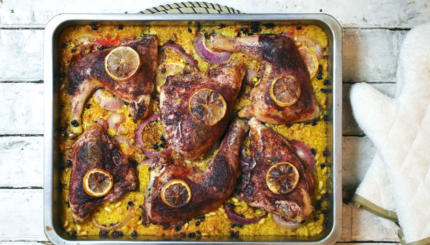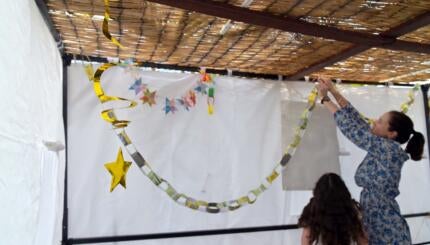Commentary on Parashat Beshalach, Exodus 13:17-17:16
In Parashat Beshalach, our attention is most often drawn to its high point: the exodus out of Egypt and joyous Song of the Sea, sung as the Israelites crossed to freedom on dry land. Indeed, this Shabbat is named for this moment and this song: Shabbat Shira. Yet, most of our parasha is actually concerned with what comes next: what happens after the triumphant peak, the moment of spiritual ecstasy experienced at the sea.
A month passes. On the other side of the Reed Sea, the Israelites find a wilderness without sustenance; the people collectively crash. Overcome by fear and hunger, they cry out to Moses and Aaron, saying they wish they had died in Egypt where, at least, food was abundant. They would rather have died enslaved but sated than starving in this place of scarcity. (Exodus 16:2–3)
In response, God meets the immediate need and tells the people that they will receive food twice daily. Meat will be available in the evening and manna, a miraculous substance that appears with the dew, will be available to them each morning. The people are instructed to go out each day to gather what they need for themselves and their households. Witnessing the presence of plentiful nourishment, they will understand that God has not abandoned them.
The manna must be gathered each morning and cannot be stored. If kept overnight, it spoils. Why does God provide a nourishment that does not keep? Perhaps so the Israelites will learn again and again that there is something in which they can place trust. They will be nourished and will not perish.
With your help, My Jewish Learning can provide endless opportunities for learning, connection and discovery.
There is one exception to this rule. On the sixth day of each week, the people are instructed to gather a double portion of manna and keep some to eat on Shabbat, a day of rest in which we do no labor and do not try to alter our environment in any way. This is another act of trust: They must trust the manna gathered on Friday will carry them through the next day. This is why Shabbat meals customarily include two loaves of challah.
Cultivating a sense of trust that our needs will be met is not an easy task, not then and not for many of us today. Too many of us were raised or socialized in ways that taught us, implicitly or explicitly, that we cannot trust ourselves, our bodies, our communities or the world at large to care for us. Perhaps we did not have enough to sustain us physically. Every day was a struggle to make ends meet and we lived with an enduring sense of shame and marginalization. Perhaps on the outside it appeared that everything was going well for us but underneath that facade, the truth was that life was shallow and we lacked the ability to emotionally connect with those around us; our spiritual needs were unmet. Or perhaps we are part of a group that experiences historical and ongoing social marginalization and we have been taught, personally and through our collective history, that the world, literally, was not designed to support us. Our needs, we have been told, are burdensome, a drain on the system, inconvenient or inconsequential to others. What does this repeated messaging do to our core sense of self?
In this week’s parasha, the Israelites are in a liminal place. Lead by leaders they barely know, recognizing in one moment tremendous miracles being done for them and in the next worried about their ability to sustain themselves, manna is a beautifully complex response. The more the Israelites experience a felt sense of nourishment — physically leaving their tents, going out, gathering the manna from the earth itself, eating it, feeding their households — the more they understand on a foundational and emotional level, beyond the intellect, that they will make it, they will be okay. It’s not enough to be given promises or even flashy miracles. They have to experience it, in small ways, every day.
When we feel a sense of destabilization in our own bones, as our ancestors did, we too have to slow down and intentionally take in all that surrounds us that is nourishing, supportive, even when the world around us is replete with tremendous challenge. Ultimately, the Israelites ate manna for 40 years, right up until they entered the land of Canaan. The nourishment remained consistent, reliable. May that be so for us and may we cultivate the practices, support and resources that will allow us to be present for others as well.



